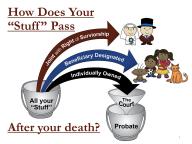|
Thursday, March 31, 2022
What is a financial power of attorney? A Financial Power of Attorney is a document in which you nominate someone to make financial decisions for you. When you appoint someone to make those financial decisions, you are called the Principal. The person you nominate to act on your behalf is called an Agent. A Financial Power of Attorney can be used for a one-time transaction, such as selling or buying a house, or it can be a durable financial power of attorney written to allow broad powers that can be used for many types of financial transactions for many years. The term “Durable” in this case means the Financial Power of Attorney remains in effect even if you, the Principal, become mentally incapacitated. Read more . . .
Thursday, March 31, 2022
In Georgia, a guardian is the term used for the person responsible for managing affairs related to the health and safety of the ward, while a conservator is responsible for the financial affairs of the ward. Ward is the term used for someone who has a guardian or conservator. The relationship of the guardian or conservator to the ward is similar to that of a parent to a minor child. The judge of the probate court in the county in which the ward resides or can be found appoints guardians and conservators. When a guardian or conservator is appointed, the ward loses many rights. Read more . . .
Wednesday, February 10, 2021
 What should you do when a loved one dies? How and when does the estate get administered? Administration is defined as Court-supervised distribution of an estate during probate. Also used to describe distribution process for a trust. Probate means proving the will, but it can also be used to indicate a court process to handle a deceased person’s estate. When a loved one dies, there is often confusion and panic about what legal and financial steps should be taken by survivors. There may be little information about the finances of the decedent, and spouses or children are left to sort through what may seem like a never-ending mass of papers. Read more . . .
Monday, December 28, 2020
 An heir is the person or persons who are related by blood that would inherit from a decedent ( a person who has died) if the decedent had no will. An heir is the person or persons who are related by blood that would inherit from a decedent ( a person who has died) if the decedent had no will.
A beneficiary is a person (or charity or institution) named in a will to whom the decedent wishes to leave his or her assets at the time of death.
Who are your heirs? Take your wrist and place two fingers on your other hand and place them on your wrist. Do you feel a pulse? If so, you don’t yet have any heirs. That is kind of a snarky way to explain that we cannot know who your heirs are until you are dead.Read more . . .
Friday, February 7, 2020
 My favorite hobby is reading and I try to combine my love of reading with my profession of estate planning. The plots of some of my favorite books are about dysfunctional family relationships complicated by really bad estate planning!Here are three books I recommend where siblings were torn apart by their parents’ bad estate planning choices.The Nestby Cynthia D’Aprix SweeneyThe four siblings of the Plumb family - Leo, Melody, Beatrice, and Jack- are the beneficiaries of a trust fund they call “The Nest” left to them by their father. The terms of the trust provide that the trust assets will be distributed equally to the four siblings when the youngest, Melody, reaches age 40. When the book begins, Melody is fast-approaching her 40th birthday, and each of the siblings is anxiously awaiting the distribution that could solve their self-inflicted life problems.
Read more . . .
Wednesday, December 4, 2019
 Happy Holidays! Is It Time to Have a Conversation About Long-term Care with an Aging Parent?Like many families, mine is scattered all over the United States. Work and other commitments make it difficult to visit distant loved ones more than a few times a year. When visiting, it is hard to gauge the health and safety of family members because they are often not going about their normal daily activities. A few years ago, while visiting my dad in Oregon, I noticed that there was something not quite right with him. He was repeating himself and telling stories about his history that I was pretty sure were not true.Read more . . .
Friday, August 17, 2018
 When nominated to become a surrogate healthcare decision maker for someone, you may be asked to make decisions about what healthcare procedures and care will be appropriate for someone other than yourself. You will only be asked to make healthcare decisions if the person is not able to make or communicate those decisions. you may have to decide what medical care the person would want without ever having discussed the issue with them. In general, as a healthcare surrogate you will have the right to: Make choices about all medical care for the person, to include surgery, medical tests and pain management. Make choices about where the person will receive treatment Take legal action in order to have the person’s wishes honored Apply for insurance, including Medicare and Medicaid for the person
Read more . . .
Monday, June 26, 2017
To help your parents get their affairs in order, you should first make sure that you or someone trustworthy has the legal ability to manage your parent’s affairs. This article is a guide to the four fundamental legal documents you and your parent may need in order to get financial affairs in order. Read more . . .
Thursday, December 3, 2015
 This year, a relative of mine had two issues that affected her prescription plan. First, she was diagnosed with an illness and prescribed new drugs. Second, she forgot to pay her Medicare Part D premiums and lost her prescription coverage. How do you choose a Medicare Part D plan? How do changes in medication affect the Part D insurance plan a participant might choose? This year, a relative of mine had two issues that affected her prescription plan. First, she was diagnosed with an illness and prescribed new drugs. Second, she forgot to pay her Medicare Part D premiums and lost her prescription coverage. How do you choose a Medicare Part D plan? How do changes in medication affect the Part D insurance plan a participant might choose?
Read more . . .
Thursday, August 6, 2015
 How do we decide how we want to be treated at the end of life? What would a good day look like if you were suffering from a terminal illness? This is one of the questions Dr. Atul Gawande asks in Being Mortal, Medicine and What Matters in the End, New York: Metropolitan Books, Henry Holt and Company, 2014, his book exploring medical treatment at the end of life. Dr. Gawande looks at how this one question, along with a series of questions most physicians are not asking their patients, might shape the course of medical treatment and care of those who are terminally ill, as well as those frail elderly who are in need of long term care. In the book, one patient says that he is willing to have medical treatment for his terminal illness so long as the treatment will allow him to eat ice cream and watch football on television. Read more . . .
Thursday, July 16, 2015
 July is Sandwich Generation Awareness Month. The Sandwich Generation refers to those people, mostly in their mid-40’s to late 50’s, who are caring for aging parents as well as caring for young children or dependent young adult children. If you are the meat or peanut butter in that sandwich, you might be looking for help from your siblings or other family members. One of the best ways to plan the care for an aging or disabled family member is by holding a family meeting. The meeting is designed to do many things: get information from the aging or disabled person about their needs, figure out what kind of care is needed and brainstorm about ways to find that care, gauge the financial resources available for care, and assign duties to various family members so that one caregiver does not get burned out. Read more . . .
The Elrod-Hill Law Firm,LLC assists clients with Estate Planning, Veterans Benefits, Medicaid, Elder Care Law, Probate, Special Needs Planning and Pet Trusts in the North Atlanta area including the counties of Dekalb, Gwinnett and Fulton.
|

|
|
|